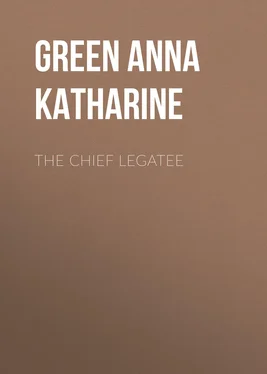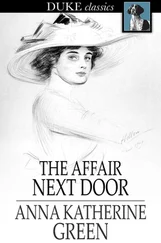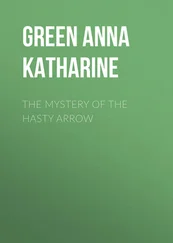Anna Green - The Chief Legatee
Здесь есть возможность читать онлайн «Anna Green - The Chief Legatee» — ознакомительный отрывок электронной книги совершенно бесплатно, а после прочтения отрывка купить полную версию. В некоторых случаях можно слушать аудио, скачать через торрент в формате fb2 и присутствует краткое содержание. Жанр: foreign_prose, Классический детектив, foreign_detective, foreign_antique, на английском языке. Описание произведения, (предисловие) а так же отзывы посетителей доступны на портале библиотеки ЛибКат.
- Название:The Chief Legatee
- Автор:
- Жанр:
- Год:неизвестен
- ISBN:нет данных
- Рейтинг книги:3 / 5. Голосов: 1
-
Избранное:Добавить в избранное
- Отзывы:
-
Ваша оценка:
- 60
- 1
- 2
- 3
- 4
- 5
The Chief Legatee: краткое содержание, описание и аннотация
Предлагаем к чтению аннотацию, описание, краткое содержание или предисловие (зависит от того, что написал сам автор книги «The Chief Legatee»). Если вы не нашли необходимую информацию о книге — напишите в комментариях, мы постараемся отыскать её.
The Chief Legatee — читать онлайн ознакомительный отрывок
Ниже представлен текст книги, разбитый по страницам. Система сохранения места последней прочитанной страницы, позволяет с удобством читать онлайн бесплатно книгу «The Chief Legatee», без необходимости каждый раз заново искать на чём Вы остановились. Поставьте закладку, и сможете в любой момент перейти на страницу, на которой закончили чтение.
Интервал:
Закладка:
"I am going to astonish you," said he. "The fellow is so plain that children must cry at him. He has suffered some injury and his mouth and jaw have such a twist in them that the whole face is thrown out of shape. So you see," continued the unhappy bridegroom, as his eyes flashed from the detective's face to that of the manager's, "that the influence he exerts over my wife is not that of love. No one could love him . The secret's of another kind. What kind, what, what, what? Find out and I'll pay you any amount you ask. She is too dear and of too sensitive a temperament to be subject to a wretch of his appearance. I cannot bear the thought. It stifles, it chokes me; and yet for three hours I've had to endure it. Three hours! and with no prospect of release unless you—"
"Oh, I'll do something," was Gerridge's bland reply. "But first I must have a few more facts. A man such as you describe should be easy to find; easier than the lady. Is he a tall man?"
"Unusually so."
"Dark or light?"
"Dark."
"Any beard?"
"None. That's why the injury to his jaw shows so plainly."
"I see. Is he what you would call a gentleman?"
"Yes, I must acknowledge that. He shows the manners of good society, if he did whisper words into my wife's ear which were not meant for mine."
"And Mr. Fulton knows nothing of him?"
"Nothing."
"Well, we'll drop him for the present. You have a photograph of your wife?"
"Her picture was in all the papers to-night."
"I noticed. But can we go by it? Does it resemble her?"
"Only fairly. She is far prettier. My wife is something uncommon. No picture ever does her justice."
"She looks like a dark beauty. Is her hair black or brown?"
"Black. So black it has purple shades in it."
"And her eyes? Black too?"
"No, gray. A deep gray, which look black owing to her long lashes."
"Very good. Now about her dress. Describe it as minutely as you can. It was a bride's traveling costume, I suppose."
"Yes. That is, I presume so. I know that it was all right and suitable to the occasion, but I don't remember much about it. I was thinking too much of the woman in the gown to notice the gown itself."
"Cannot you tell the color?"
"It was a dark one. I'm sure it was a dark one, but colors are not much in my line. I know she looked well—they can tell you about it at the house. All that I distinctly remember is the veil she had wound so tightly around her face and hat to keep the rice out of her hair that I could not get one glimpse of her features. All nonsense that veil, especially when I had promised not to address her or even to touch her in the cab. And she wore it into the office. If it had not been for that I might have foreseen her intention in time to prevent it."
"Perhaps she knew that."
"It looks as if she did."
"Which means that she was meditating flight from the first."
"From the time she saw that man," Mr. Ransom corrected.
"Just so; from the time she left her uncle's house. Your wife is a woman of means, I believe."
"Yes, unfortunately."
"Why unfortunately?"
"It makes her independent and offers a lure to irresponsible wretches like him."
"Her fortune is large, then?"
"Very large; larger than my own."
Every one knew Mr. Ransom to be a millionaire.
"Left her by her father?"
"No, by some great-uncle, I believe, who made his fortune in the Klondike."
"And entirely under her own control?"
"Entirely so."
"Who is her man of business?"
"Edward Harper, of—Wall Street."
"He's your man. He'll know sooner or later where she is."
"Yes, but later won't do. I must know to-night; or, if that is impossible, to-morrow. Were it not for the mortification it would cause her I should beg you to put on all your force and ransack the city for this bride of five hours. But such publicity is too shocking. I should like to give her a day to reconsider her treatment of me. She cannot mean to leave me for good. She has too much self-respect; to say nothing of her very positive and not to be questioned affection for myself."
The detective looked thoughtful. The problem had its difficulties.
"Are those hers?" he asked at last, pointing to the two trunks he saw standing against the wall.
"Yes. I had them brought up, in the hope that she had slipped away on some foolish errand or other and would yet come back."
"By their heft I judge them to be full; how about her hand-bag?"
"She had only a small bag and an umbrella. They are both here."
"How's that?"
"The colored boy took them at the door. She went away with nothing in her hands."
Gerridge glanced at the bag Mr. Ransom had pointed out, fingered it, then asked the young husband to open it.
He did so. The usual articles and indispensable adjuncts of a nice woman's toilet met their eyes. Also a pocketbook containing considerable money and a case holding more than one valuable jewel.
The eyes of the officer and manager met in ill disguised alarm.
"She must have been under the most violent excitement to slip away without these," suggested the former. "I'd better be at work. Give me two hours," were his parting words to Mr. Ransom. "By that time I'll either be back or telephone you. You had better stay here; she may return. Though I don't think that likely," he muttered as he passed the manager.
At the door he stopped. "You can't tell me the color of that veil?"
"No."
"Look about the room, sir. There's lots of colors in the furniture and hangings. Don't you see one somewhere that reminds you of her veil or even of her dress?"
The miserable bridegroom looked up from the bag into which he was still staring and, glancing slowly around him, finally pointed at a chair upholstered in brown and impulsively said:
"The veil was like that; I remember now. Brown, isn't it? a dark brown?"
"Yes. And the dress?"
"I can't tell you a thing about the dress. But her gloves—I remember something about them. They were so tight they gaped open at the wrist. Her hands looked quite disfigured. I wondered that so sensible a woman should buy gloves at least two sizes too small for her. I think she was ashamed of them herself, for she tried to hide them after she saw me looking."
"This was in the cab?"
"Yes."
"Where you didn't speak a word?"
"Not a word."
"Though she seemed so very much cut up?"
"No, she didn't seem cut up; only tired."
"How tired?"
"She sat with her head pressed against the side of the cab."
"And a little turned away?"
"Yes."
"As if she shrank from you?"
"A little so."
"Did she brighten when the carriage stopped?"
"She started upright."
"Did you help her out?"
"No, I had promised not to touch her."
"She jumped out after you?"
"Yes."
"And never spoke?"
"Not a word."
Gerridge opened the door, motioned for the manager to follow, and, once in the hall, remarked to that gentleman:
"I should like to see the boy who took her bag and was with them when she slipped away."
CHAPTER II
THE LADY IN NUMBER THREE
The boy was soon found and proved to be more observing in matters of dress than Mr. Ransom. He described with apparent accuracy both the color and cut of the garments worn by the lady who had flitted away so mysteriously. The former was brown, all brown; and the latter was of the tailor-made variety, very natty and becoming. "What you would call 'swell,'" was the comment, "if her walk hadn't spoiled the hang of it. How she did walk! Her shoes must have hurt her most uncommon. I never did see any one hobble so."
"How's that? She hobbled, and her husband didn't notice it?"
"Oh, he had hurried on ahead. She was behind him, and she walked like this."
Читать дальшеИнтервал:
Закладка:
Похожие книги на «The Chief Legatee»
Представляем Вашему вниманию похожие книги на «The Chief Legatee» списком для выбора. Мы отобрали схожую по названию и смыслу литературу в надежде предоставить читателям больше вариантов отыскать новые, интересные, ещё непрочитанные произведения.
Обсуждение, отзывы о книге «The Chief Legatee» и просто собственные мнения читателей. Оставьте ваши комментарии, напишите, что Вы думаете о произведении, его смысле или главных героях. Укажите что конкретно понравилось, а что нет, и почему Вы так считаете.












